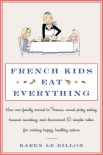French Kids Eat Everything Karen Billon (romance novel chinese novels txt) 📖

- Author: Karen Billon
Book online «French Kids Eat Everything Karen Billon (romance novel chinese novels txt) 📖». Author Karen Billon
We’ll just have to have really delicious snacks, I thought. Suddenly, this didn’t seem like such a bad idea after all.
I proudly pointed out the new rule to Philippe when he wandered into the kitchen later that day. Thoughtful, he studied it for a while.
“That’s good,” he said. “But not good enough. We have to change their minds about feeling like they need to snack all of the time. It’s not that we are preventing them from snacking impulsively. They have to learn new habits so that they don’t want to snack.” With that, he picked up a marker, and added a line:
In between meals, it’s okay to feel hungry.
At meals, eat until you’re satisfied rather than full.
This is likely to seem the cruelest rule to non-French readers. It certainly seemed cruel to me. Not feeding your children when they’re hungry? Really? My first impulse was to cross out this rule and cancel the snack-scheduling experiment. But I decided to hear him out.
“Of course I don’t believe that children should be hungry,” he started. “And nobody else in France does either! I’m saying it’s okay to feel hungry,” he added. “That way, kids get used to the feeling of an empty stomach, which is normal and healthy.”
This is why French parents don’t mind if their children feel hungry before meals. They believe that it is better to wait longer, and to eat a larger, healthier meal at regular intervals. The French even have proverb that expresses their attitude to hunger: “Bon repas doit commencer par la faim.” This proverb (literally, a good meal must start with hunger) means something like “hunger is the best seasoning.” Philippe’s comment reminded me of one of my mother-in-law’s sayings: “The stomach is a muscle. And just like any other muscle, it should be allowed to rest. It shouldn’t constantly be asked to work.” According to her philosophy, eating too frequently could cause excess gastric acid to be secreted, which could in turn irritate the stomach. I hadn’t bothered to check whether this bit of folk wisdom had any scientific proof, but she firmly believed in it.
“And besides,” my husband concluded triumphantly, “French kids don’t really feel that hungry because they eat so well at mealtimes!”
This was true. I had noticed this very curious effect myself. When we spent time with his family and ate the meals they did, I felt satisfied for hours. And even when I could sense that my stomach was empty again, I felt so replenished that I really wasn’t hungry. This wasn’t because we were stuffing ourselves. The portions were usually smaller than what I grew up with, and I never felt that groaning feeling of painful fullness that I’d sometimes had after visiting our favorite all-you-can-eat buffet in Vancouver.
Back home, I had usually eaten one snack in the midmorning and a second snack at some point in the afternoon. I had gradually stopped doing that after we moved. This wasn’t deliberate; it was just that I no longer felt hungry in between meals. Part of the reason, I realized after a few months, was that the food was so good that I really needed less. Like the little handmade chocolates that we bought at the local chocolatier, which came in amazing flavors (like Earl Grey tea, or rose flower, or lavender) and were so densely delicious that just one was often enough to leave me feeling satisfied.
Only later did I find out that this feeling—of satisfaction, of being replenished—has a scientific basis. The traditional French diet, as it turns out, has a higher proportion of “high satiety” foods than the conventional American diet. These foods are basically ones that make you feel full with fewer calories. A lot of research has been done on satiety, but the basic message is that some foods make us feel more full than others: whole grains, beans, lentils, oats, lean meats, fish, leafy greens, and high water/fiber content vegetables and fruits. As this list suggests, these foods are usually protein- and fiber-rich. They fill you up for longer, delaying the time at which you next feel hungry, particularly when eaten with an appropriate (read: small) amount of high-fat foods (which stimulate the production of hormonal “satiety signals” and therefore make us feel satisfied longer). This, of course, is exactly the mix of foods that French children are fed in the school cantine: protein, vegetables, and just a little bit of fat in their cheese or dessert. As a result of eating this way, they feel satisfied for longer.
Contrast this with North America. When American children feel hungry, parental desperation tends to set in immediately. Children are given something—anything—to stave off hunger. If asked, many American parents would prefer to give something unhealthy to their kids rather than make them wait. If French children are hungry, on the other hand, they are simply promised that they’ll be able to eat well at the next meal. And this training starts, in some cases, from birth. I saw this firsthand with my husband’s friend Margot. We phoned her in the hospital to congratulate her when baby Thomas was two days old. We could hear his bellowing through the phone as clearly as if he were sitting next to us.
“Poor thing,” I said, “it sounds as if he’s





Comments (0)